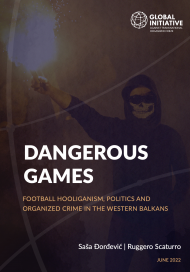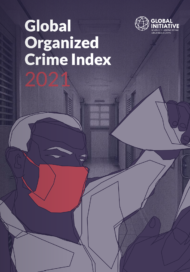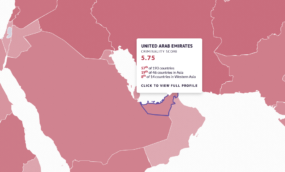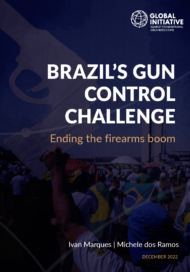Posted on 01 Dec 2022
The 2022 World Cup kicked off in Qatar before some 2 million fans, who had descended from all corners of the globe on the tiny Gulf state to cheer on their teams. The fireworks and light shows during the dazzling opening ceremony of the world’s largest sporting competition did little to mask the shadow cast over a tournament dogged by controversy and criminal underpinnings.
The world of professional football has long been known to have ties to crime of various sorts. The sport has deep links with violence, hooliganism and geopolitics. Meanwhile, Europol recently revealed how criminal networks are increasingly turning to match-fixing as a money laundering method. Amid long-standing allegations of a culture of bribery within the organizer, FIFA, and its top executives embroiled in scandals and power politics, the World Cup’s power to draw billions of people globally also makes it an ideal target for organized crime.
Against this backdrop, the fact that this year’s tournament is hosted by Qatar has amplified cries over criminality and corruption surrounding the sport. International concerns around the spectre of organized crime have become very much a feature of this year’s tournament – from how Qatar may have won the hosting bid fraudulently, to logistics and construction, human rights abuses and security reforms.
Rumours of fraud at FIFA have been swirling like a desert storm ever since the football body’s seemingly dubious decision to award the hosting rights to Qatar, a country without a football culture and with no stadium capacity. Since Qatar won the bid in 2010, 15 of FIFA’s 22 voting executive members have since faced criminal charges for illicit activities, including racketeering, wire fraud and money laundering.
Upon winning the bid, in 2011 Qatar began preparing for the largest sporting event in the world – no easy feat given the country’s size, climate and limited infrastructure. The government brought in hundreds of thousands of foreign workers, mostly from South Asia, to construct the facilities needed to host the event. In 2021 alone, it was estimated that Qatar’s population increased by 13.2% as migrant workers poured in to work on construction projects directly and indirectly related to the World Cup.
Many of these workers are recruited under the Kafala employment system, widely used throughout Western Asia, whereby employers ‘sponsor’ migrant workers they recruit. While intended to offer support to workers arriving in a new country, in practice, such arrangements are often exploitative and can amount to human trafficking. According to the 2021 Global Organized Crime Index, human trafficking was identified as the most pervasive criminal market in Qatar (scoring an 8 out of 10) and the wider Western Asia region.
In the ten years since Qatar won its bid, over 6 500 migrant workers have reportedly lost their lives, according to one media source, though Qatari officials claim that number is more likely between 400 and 500 deaths. Still, many more continue to be subjected to poor living and working conditions, in some cases having their documents confiscated by their sponsors, and denied the right to change jobs or leave the country.
In response to mounting criticism and global calls to overhaul the region’s Kafala system, the Qatari government has since announced reforms aimed at improving working conditions for its migrant workers, including the implementation of minimum wages and abolishing the employer approval requirement for changing jobs or leaving the country. While critics assert that more can still be done, outcries over such labour practices have been met with criticism of their own, including from FIFA itself. As it stands, despite its widescale abuse, the Kafala system provides a legal framework for labour migration to the region. And there are concerns that a complete overhaul without alternative legal systems in place may unintentionally increase human smuggling as desperate workers from source countries may seek informal ways to reach the region where the local workforce is small and jobs are plentiful.
Although Qatar’s new labour policies may be met with cautious optimism, impactful changes to a system so firmly embedded in the country’s labour practices will take time, and it remains to be seen whether these reforms will translate into long-lasting positive effects once the World Cup is over.
But it’s not just migrant workers who have become victims to criminal practices. The World Cup is the most watched event in the world, with billions of fans around the globe eager to be a part of it, either by tuning in from home, purchasing merchandise or travelling to matches in person. With such an immense captive audience, criminals have stepped in to profit from the global enthusiasm.
In Qatar there have been reports of seizures of counterfeit products related to the event. Shortly before it started, Qatari authorities seized 144 counterfeit World Cup trophies, as well as products illegally branded with the World Cup logo. On 17 November, customs officials in Hong Kong arrested 15 people and seized more than 100 000 counterfeit football jerseys worth approximately US$6.3 million intended for export around the world.
But there is a much larger threat looming around the football tournament: cybercrime. While online criminal activities are ever present, large events that require massive amounts of logistical planning like the World Cup are particularly vulnerable to cyberattacks. For example, during the previous World Cup in 2018, Russian authorities reported blocking 25 million online attacks, and in Japan 450 million attacks on the Olympics official website were identified in 2020.
Although Qatar has reportedly invested US$1.1 billion in cybersecurity, hackers may set up fraudulent sites for ticket sales, hotel bookings and other reservations to steal personal and financial data from unsuspecting football fans. Alongside these risks are concerns about surveillance and privacy issues related to use of Qatar’s official World Cup apps. Various cybersecurity intelligence firms have carried out analyses of this year’s World Cup, identifying vulnerabilities from brand protection and the spreading of misinformation to cyberthreats and data leakage.
While Qatari and football industry elites may be hoping for the controversy to settle as the tournament continues and all eyes are set on the world’s most beloved sport, the World Cup is uncovering some of Qatar’s most prominent challenges in fighting organized crime. Even though Qatar’s overall resilience to criminality is comparably higher than that of other countries in Western Asia – according to the Organized Crime Index, the country ranks third in resilience in the region – the country needs to improve its game off the field if it is to set itself apart as a regional leader in the fight against organized crime.
At first glance, Qatar appears to engage in various sound international anti-crime and corruption initiatives, including establishing the Rule of Law and Anti-Corruption Centre in 2013 and signing a funding agreement with the United Nations Office on Drugs and Crime to strengthen judicial integrity and prevent corruption, as provided in the Doha Declaration. Similarly, after having adopted a cybersecurity strategy in 2014, leading up to the World Cup Qatar has been working bilaterally with several countries, including the United States, to jointly combat the growing presence of cybercriminals.
However, as the irregularities around the World Cup in Qatar demonstrate, the country’s susceptibility to corruption has created a fertile ground for illicit activities to flourish. National anti-corruption safeguard mechanisms are limited in Qatar (according to the Index, it scores just 5.5 out of 10 for ‘Government Transparency and Accountability’), and those that do exist are primarily targeted at low-level officials. While more senior political figures are generally given carte blanche, in 2021, in an unprecedented move, the country’s finance minister was arrested on allegations of corruption – though, notably, some have reportedly framed the arrest as motivated by politics rather than judicial integrity.
While the issues of organized crime in Qatar arising in light of the 2022 World Cup may seem unrelenting, hosting the event has given the country an opportunity to stand out as a regional leader in resilience. To do that, the country will need to translate intentions into action and ensure that reforms last well beyond after the tournament’s final whistle is blown.



